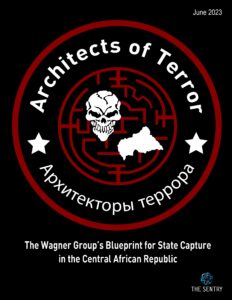 Read the full report and recommendations
Read the full report and recommendations
> en français
Executive Summary
When the paramilitary organization the Wagner Group—Vladimir Putin’s “private army”—first set foot in the Central African Republic (CAR) five years ago,* the Russian Federation was reestablishing diplomatic relations with CAR after a 40-year absence.* The country had been ravaged by 20 years of politico-military crises and cycles of deadly armed conflicts that the United Nations and Western countries were failing to adequately address.* * With no solution in sight, Russia offered Central African President Faustin-Archange Touadéra an alternative in the form of diplomatic support and military and political assistance via Wagner.* * * What resulted was a campaign of terror.
While various armed groups have continued to commit egregious human rights violations against civilians, The Sentry’s investigation found that, under the cover of a counteroffensive against anti-Touadéra armed groups, Wagner, Touadéra, and his inner circle have perpetrated widespread, systematic, and well-planned campaigns of mass killing, torture, and rape throughout the country. Executed by Central African armed forces and Wagner fighters backed by militiamen, these campaigns of terror have served as psychological warfare to force anti-Touadéra militiamen and their allies to accept defeat and the broader population to accept the authority of Wagner and of Russia’s ally, Touadéra.*
In order to “annihilate” their enemies, Wagner, Touadéra, and his inner circle raised a parallel army that could be controlled and privatized for their own interests.* In the past two years, Wagner has increased the training and outfitting of approximately a dozen military units—most of which were created after January 2021, with many of the newly incorporated soldiers being members of Touadéra’s ethnic community—and of militiamen who have been deployed as proxies in military operations. While Touadéra’s inner circle retains control of operations within the capital Bangui, Wagner has managed to establish military control of operations outside Bangui, for which their motto is “leave no trace”—in other words, kill everyone, including women and children. In the midst of this, Wagner has shown intense interest in controlling Central African minerals, particularly gold and diamonds, targeting mining sites and using violent military campaigns to drive civilians away from mining areas.* * Wagner-affiliated mining companies—primarily Lobaye Invest, Midas Ressources, and Diamville—have been granted mining licenses and export authorizations, and Wagner has been using its transnational networks in CAR, Sudan, Cameroon, Madagascar, and Russia to help set up industrial-scale gold production, thereby escaping national and international scrutiny.* * * *
The situation in CAR today is more concerning than ever. A recent study found that 5.6% of CAR’s population died in 2022, which is “more than twice as high as estimates for any other country in the world.”* The authors of the study “raised the alarm over a humanitarian crisis exacerbated by Wagner’s activities,” concluding that “the efforts of the Wagner mercenaries at least contributed to increased difficulties of survival over the past two years.”* *
In CAR, Wagner has perfected a blueprint for state capture, supporting a criminalized state hijacked by the Central African president and his inner circle, amassing military power, securing access to and plundering precious minerals, and subduing the population with terror. As Wagner continues to expand its reach into ever more countries—with Burkina Faso being the most recent example, and Chad being the next target in central Africa—it is likely that the paramilitary group will continue to deploy strategies that have seen success.* The use of propaganda and terror as psychological warfare has been observed in several African countries where the group has established its presence, particularly in CAR and Mali.* In these two countries, Wagner’s modus operandi has aimed to expand Russian influence, to the detriment of Western interests; Wagner’s hard and soft power—backed with Russian political and logistical support—has thus resulted in a diplomatic rupture with Western countries.* In other countries, such as Libya and Sudan, Wagner has infiltrated groups led by militia commanders Khalifa Haftar and Mohamed Hamdan Dagalo, or “Hemedti,” that it then uses to guarantee logistical facilities and financial gains.* *
While Wagner has been building on established blueprints, the international community—critically including African states—has various tools to counter Wagner’s malign presence in CAR and on the African continent more broadly.
Key recommendations
- UN member states should establish a coalition similar to the Global Coalition to Defeat Daesh/ISIS—critically including African states—to counter the Wagner Group’s malign influence on the African continent and elsewhere by focusing on the group’s finances, movement of foreign fighters, and propaganda.
- The United States, the United Kingdom, the European Union, Canada, Japan, and other jurisdictions should widen the scope of sanctions imposed against the Wagner Group’s network, including by investigating the individuals and entities named in this report. They should investigate and impose network sanctions against the individuals and entities linked to Touadéra’s inner circle that are enabling Wagner’s presence in CAR, and they should coordinate such sanctions actions to increase impact.
- The US should designate the Wagner Group as a foreign terrorist organization, as reporting by The Sentry and others clearly indicates that the group meets the three legal criteria for designation—a foreign organization engaging in terrorist activity that threatens national security.
- The EU and its member states should add Wagner to the EU terrorist list to allow for greater law enforcement and judicial cooperation on Wagner across EU member states and beyond.
- The UK should also consider taking steps to proscribe Wagner as a terrorist group under the Terrorism Act 2000.
Read the full report >

